 Travel Vocabulary: Using English for Travel
Travel Vocabulary: Using English for Travel
Travel vocabulary is one of the most useful areas of language learning today, as more people than ever are travelling far and wide for business and pleasure. There are many useful words and phrases we use when travelling and dealing with transport.
Although our travel plans have been put on hold for a while due to the Coronavirus pandemic, the world is slowly starting to open up again. This means we need to be ready with our travel language and vocabulary for when we can get a flight, a bus or a train!
For non-native speakers, travel vocabulary is a particularly useful topic of study and always a popular subject, allowing you to enjoy organising your travels without worrying about language issues.
Explore travel vocabulary here and learn useful vocabulary related to travelling and using public transport. We have included useful words related to using trains, buses, cars, taxis, planes and boats, so you can have your travel phrases covered, whatever your mode of transport.
General English Travel Vocabulary:
to arrive, to depart, to leave, to stay,
to cancel, cancellation, cancelled, delay, delayed
to book, to reserve, reservation, to cancel a reservation
holiday, business trip
suitcase, bag, luggage
trip, journey, to travel, map
travel agent, brochure
ticket office, fare, price, single/return ticket
by foot, on foot
travelling by plane, by train, by taxi, by car, by boat
roundabout, road, traffic lights, speed limit, junction, cross roads, road signs
Transport Vocabulary and Useful Phrases:
Car
Wheels, steering wheel, dash board, indicators, headlights, roof, bonnet, boot, engine, battery, windscreen wipers, garage, car mechanic, petrol station, service (a ‘check up’ for a car)
Bus
Double decker, single decker, passengers, bus driver, bus stop, bus station, bus conductor, coach, luggage hold, bus lane
Bus travelling phrases:
the next stop, the last stop, to get on/off the bus, to buy a ticket
Train
Train station, platform, track, level crossing, locomotive, underground, cross-country, local, return, single, ticket, carriage, first/second class, train driver, ticket inspector, waiting room, seat, timetable, guard, season ticket, fare, travel card, buffet car
Train travel phrases:
to catch a train, to check the timetable, on the platform, to travel cross-country
to get on the train, to embark, to set off (on a journey)
to get off the train, to disembark, to alight
ticket machine – a machine where you can buy your train tickets
ticket gate – a mechanical gate blocking access, where you need to insert your ticket to pass through
the buffet car – a carriage on a train where you can buy drinks and snacks

Grand Central Station , New York City – image source
Taxi
Cab, black cab (official English taxi), fare, taxi rank, taxi driver, tip (noun and verb)
Taxi travel phrases:
to hail a taxi / to flag down a taxi (when you raise your arm to get a taxi driver’s attention to encourage it to stop in the street)
to pay the fare (the fare is the fee for the journey)
to tip the driver (verb) / to give the driver a tip (noun)
Plane
Aeroplane, airport, airline, wing, runway, pilot, gate, passport, excess baggage charge, cabin crew, flight attendant, air steward/stewardess, security, turbulence, seatbelt
take off, landing
turbulence (uncomfortable, sudden movements of a plane due to air pressure/temperature changes)
hand luggage (luggage you take into the cabin with you)
hold luggage/checked luggage (luggage you check in for stowage under the aircraft)
over-head locker (where you can put your hand luggage)
boarding card, customs, departures, arrivals, lounge, aisle seat, window seat, check-in, in-flight movie, in-flight entertainment
terminal 1, terminal 2 / T1, T2 (a terminal is where passengers go to buy tickets, check in luggage, go to their boarding gate etc.)
boarding gate – where passenger go to board the plane (i.e. to get on the plane), located inside the terminal building
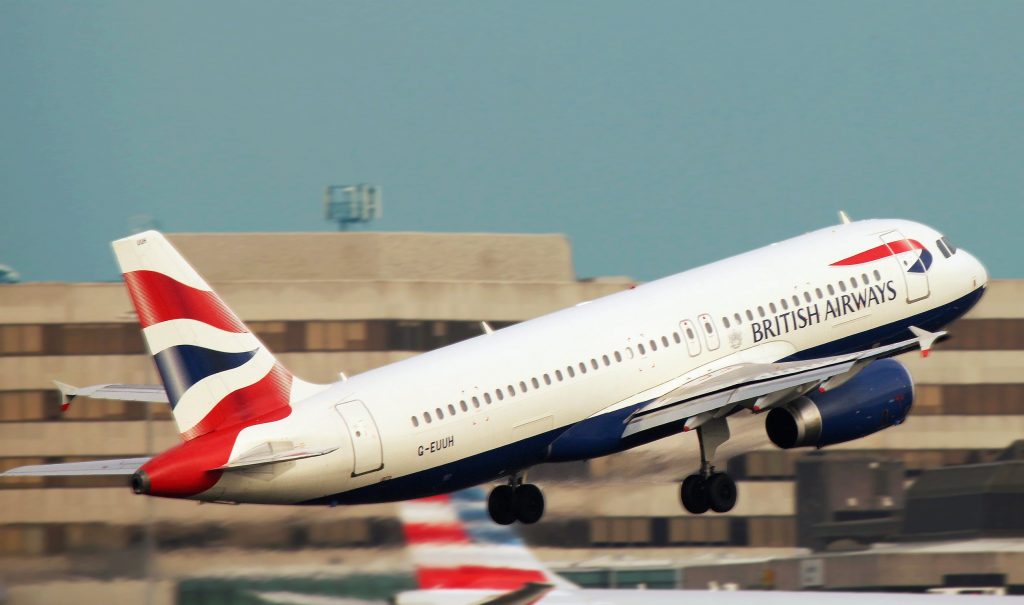
A plane takes off – image source
Plane travel phrases:
to put luggage/bags in the hold
to board the plane
prepare for take off, the plane will be taking off in 30 minutes
prepare for landing, the plane will be landing in 20 minutes
to fasten your seatbelt, to buckle up (‘buckle up’ is slang for ‘fasten your seatbelt’)
the flight was quite turbulent, to experience some turbulence, there was some light/heavy turbulence
“How was your flight?”
“It was good, thanks, except there was some turbulence during the descent that made me spill my drink!”
“Great – it was a smooth flight and I slept most of the time.”
Boat
Ferry, cruise ship, harbour, deck, port, sea, ocean, cabin, captain, sail, sea sickness, crossing, on board, life belt/jacket, foot passenger, buffet, port side, starboard
- The difference between a boat and a ship: boats are small to mid-sized vessels, often used for pleasure trips. Boat is also a generic term for water vessels. Ships are normally larger and are used to carry cargo, passengers or smaller boats.
Boat travelling phrases:
to embark (to get on the boat) / to disembark (to get off the boat)
‘choppy’ seas / rough seas / strong waves
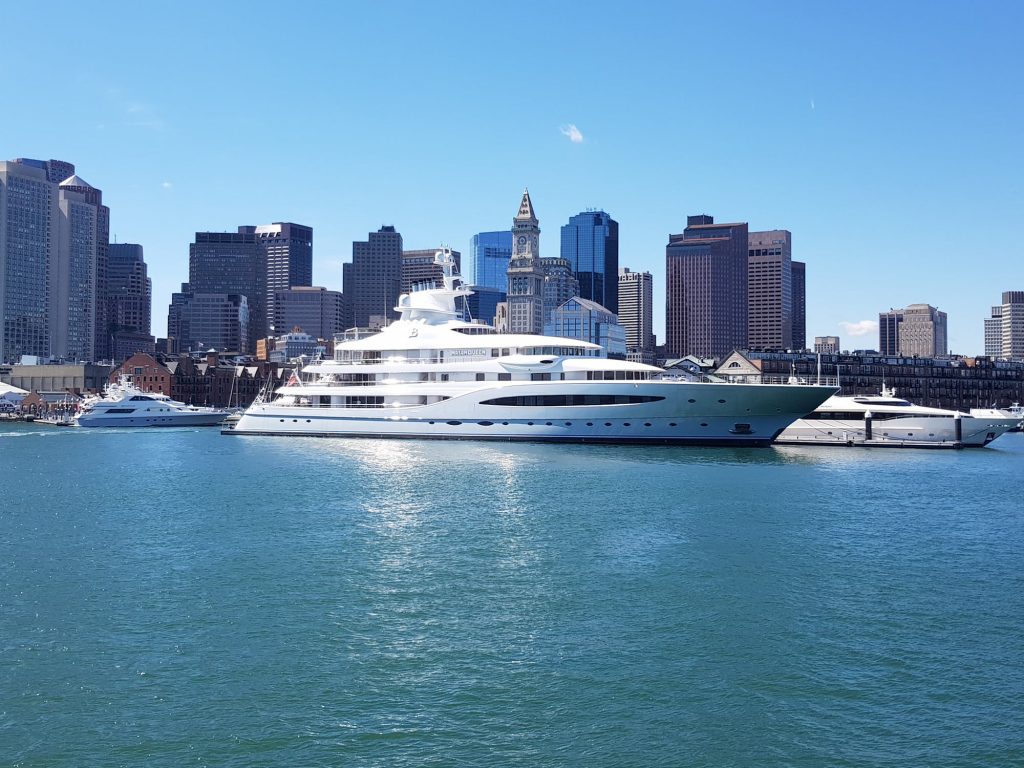
Calm waters will provide a peaceful cruise for this ship – image source
calm waters / still waters
to sail, to have a good crossing (a ‘crossing’ is when you go from one place to another on a boat/ship) – e.g. “Did you have a good crossing?”
to go out on deck (to go outside on the ship)
welcome aboard/on board (you might hear this when you embark for the first time)
the captain’s table (where the captain sits at dinner – sometimes passengers might get an invitation to site at the captain’s table at some point during their cruise)
- ‘Plain sailing’ is an idiom that means an event that goes smoothly: ‘It’s all plain sailing from here’

It’s a great day to be ‘out on deck’ – image source
English at the Train Station
Useful travelling vocabulary for using the train, including phrases you may want to say, phrases you may hear and comments you might want to make about travelling by train:
| Phrases you may want to say at train stations | |
| Could I have two first class tickets to London | When does the train arrive in Birmingham? |
| Could I buy a return ticket to London, please | Do you know how long the journey will take? |
| Which platform does the train leave from? | Do I need to change trains? |
| |
|
| Phrases you may hear | |
| How many people are travelling? | Do you want a single or return ticket? |
| The train will be delayed | You will need to change at Oxford |
| Your train leaves from platform 3. | Tickets, please! |
| The next train will arrive at platform 5 | Mind the gap! (to remind travellers to be careful when stepping off the train) |
- Train times on timetables are always given in the twenty-four hour clock format. So, 5.15 pm would be 17.15 and 9.05 am would be 09.05.
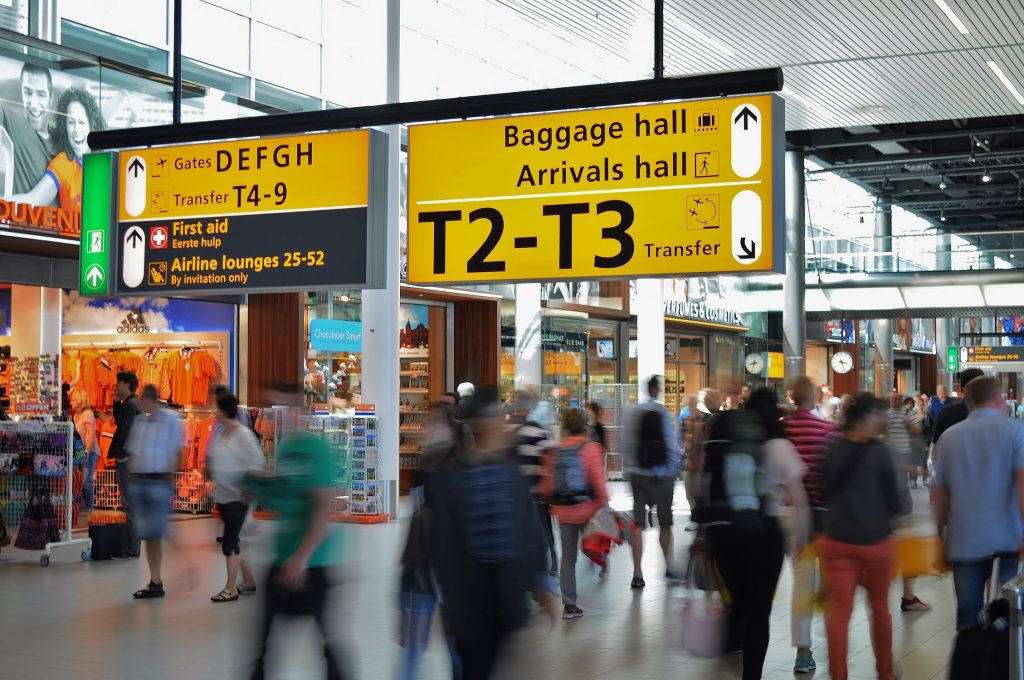
A busy airport – image source
“How was the journey?”
“It was fine, the train arrived on time and I managed to buy a coffee from the buffet car.”
“Terrible, the first two trains were cancelled and then I had to stand up for the entire journey.”
“My train was delayed, so I passed the time by browsing in the station bookshop”
English vocabulary at the airport
Travelling vocabulary for using planes and visiting the airport, including phrases you might hear at the airport and sentences you might need to say when travelling by plane:
| Phrases you may want to say | |||||
| I have a reservation. | I am travelling/flying to Paris | ||||
| I booked my ticket online. | Can I take this on board as hand luggage? | ||||
| I have my boarding pass here. | Could I check this into the hold, please? | ||||
| Here is my passport. | Where is the departure lounge? | ||||
| Which gate does my flight leave from? | Can you tell me where ‘arrivals’ is? | ||||
| I’d like a window seat / I’d like an aisle seat, please. | Could you tell me where the ‘departures’ lounge is, please? | ||||
| Phrases you may hear at airports | |||||
| Can I see your boarding card, please? | There will be an excess baggage charge. | ||||
| Do you have your booking reference number? | Please make your way to departure gate 12. | ||||
| Are you carrying any liquids? | The flight has been delayed/cancelled. | ||||
| Did you pack your bags yourself? | Last call for passenger Smith. | ||||
| You will need to check that into the hold. | Please place your suitcase on the scales. |
Click here to explore more essential English vocabulary and phrases for everyday situations.
When travelling and using transport, you might also need to ask for directions. Check out how to ask for directions in English when travelling around a city with our directions page. Our article includes possible questions you might want to ask and answers you could receive when navigating your way around a new town.
Let us know your thoughts on travel vocabulary
What do you find most difficult about using English when travelling?
Do you find any of these phrases related to travel and transport confusing?
Can you think of other useful English travel vocabulary for using different modes of transport?
TEFL teachers, how do you incorporate travelling vocabulary into your English lessons?

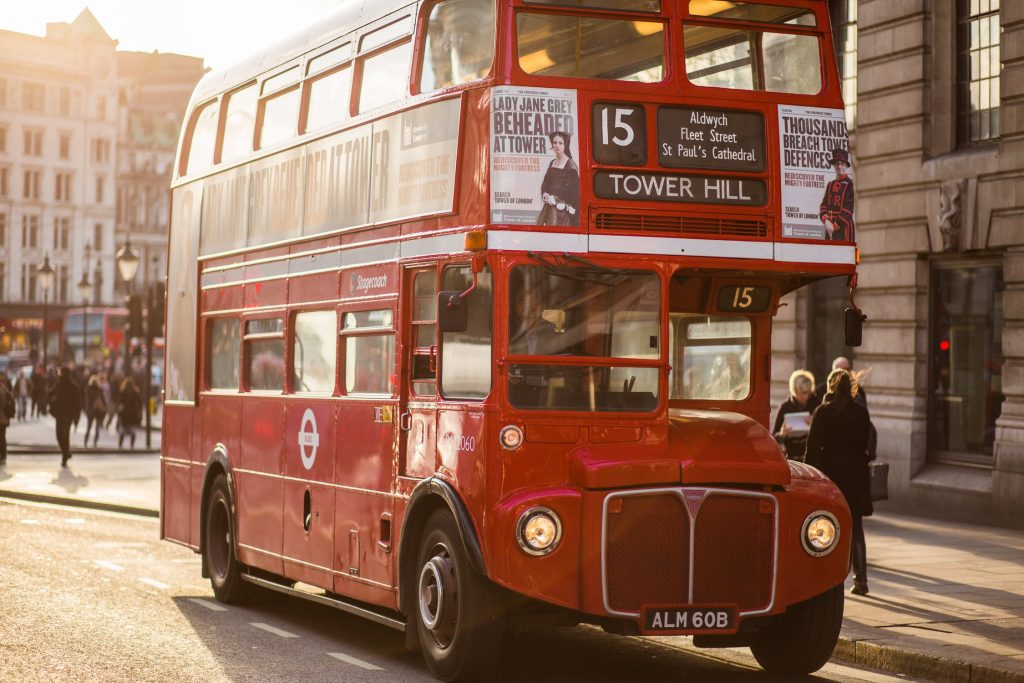
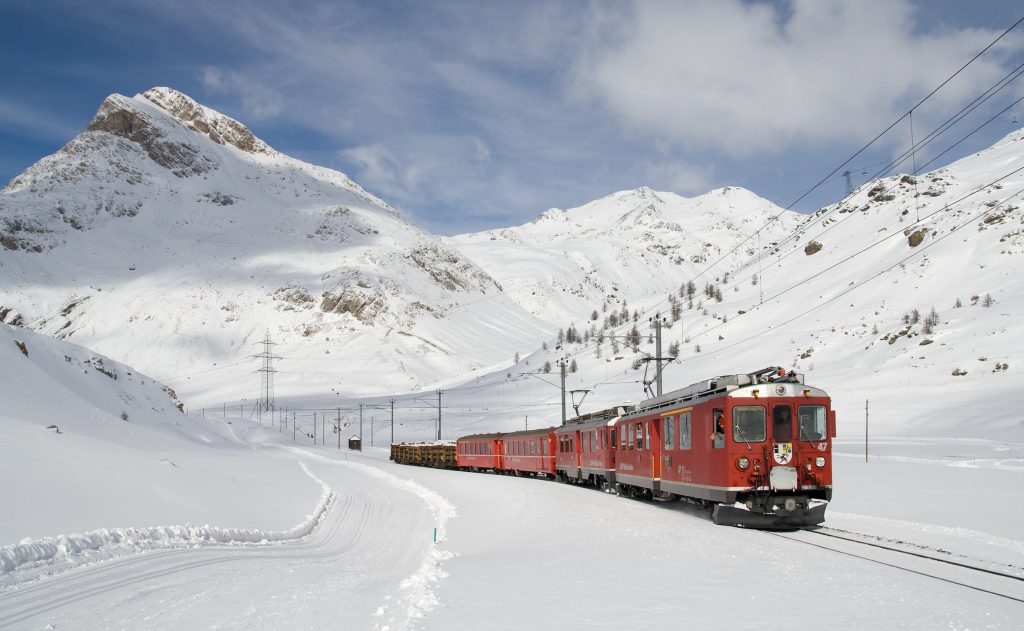
Thank you for the provided phrases and words. I would also like to see a short dialogue or common phrases when someone got lost in a city or trying to get somewhere, so that there should be various options for speaking about traveling ina city
Hi Tatyana, thanks for your comment. A dialogue like this is a great suggestion. We will looks to add something like this to the travel and transport page soon. In the meantime, you might find our directions page useful, as this contains phrases for asking for directions when travelling in a city.